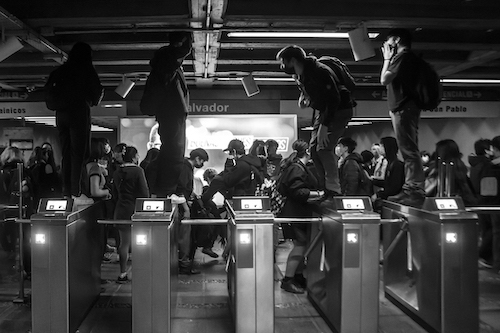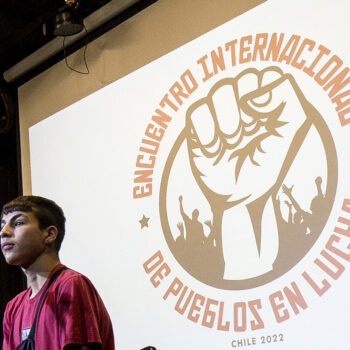Editor’s note: This article was drafted before the September 4th plebiscite rejecting the proposed constitution.
Growing up, we were told that Chile was the world’s laboratory for neoliberalism. While Augusto Pinochet’s military dictatorship committed crimes against humanity — with thousands of persons murdered or disappeared — a group of economists from the wealthy suburbs of the capital city, Santiago, went to the University of Chicago to learn from Milton Friedman. Later, they put what they learned into practice on a country that was at their mercy.
Those of us who grew up in post-dictatorship Chile inherited an unequal country, where the rich get richer every day thanks to the efforts of millions of workers; a health system with endless waiting lists; starvation pensions that force the elderly to work until they die; and an education system reserved mostly for the elite.
Even after the fall of the dictatorship, the neoliberal constitution ensured that our democracy would be a huge disappointment. We grew up in an unequal democracy, built on the same institutions we inherited from the constitution of the dictatorship. But we also grew up listening to rebellion, hearing stories of the popular movement of the 1970s that was crushed by the Armed Forces under orders from business groups. We grew up hearing stories of resistance to the dictatorship, of men and women who organized to bring down the tyrant. We felt part of those famous assaults, where trucks were stolen to distribute essential products like chicken in the poblaciones, the hood.
We knew, ever since we were born, that Chile was a country of resistance, as well as injustice, that it is home to a dignified people who are willing to fight for what is theirs, but who had been crushed by brute force and were just starting to recover. So we, the young people, decided — without thinking about it too much, perhaps not measuring the consequences — to fight “until dignity became a habit.”
In 2001, as high school students, we took part in the first mass mobilizations after the dictatorship. We helped to shatter the “forced peace” of the democratic transition that Pinochet dreamed of. This inaugurated a cycle of student mobilizations that continued in 2006, with more marches and high school occupations, protesting the education laws — written during the dictatorship — that decentralized public education and subsidized private schools.
But the clearest change of direction came in 2011, when students challenged the profit motive in education (a pillar of the neoliberal system) at the same time that workers and social movements also mobilized throughout the country. Thus began a cycle of mobilizations that would reach its highest point almost a decade later.
The government — led by President Michelle Bachelet — tried to coopt and contain the mobilizations. She used slogans from the streets but did not advance any concrete proposals for changing Chile’s educational model. During Bachelet’s administration and the next one, led by right-wing businessman Sebastián Piñera, thousands of students continued to mobilize against an entire system that undermines our lives and those of our social class. We had nothing to lose, and although those in power aggressively tried to criminalize us — unleashing a brutal repression, including putting anti-riot Special Forces on the roof of a high school in Santiago in 2018 — this only reaffirmed our power. If we weren’t a real threat, they wouldn’t have tried to crush us.
In 2019, the government decided to increase the public transport fare by 30 pesos (four cents in the USD). In early October, on the day this increase went into effect, waves of students entered stations, jumped the turnstiles, and opened the doors of the trains so that everyone passing by could ride for free without paying a single peso to the state company (managed by a public-private board) that was robbing us all.
After two weeks of demonstrations, the government decided to pursue its traditional response: not answering our demands but instead opting for the path of repression, condemning the demonstrations and packing the subway stations with Special Forces to protect the interests of the powerful. They were unable to stop us. New groups joined the demonstrations as they expanded from downtown Santiago to the entire city. We weren’t alone; rather, we were mobilizing for and with our class. The protests continued to grow, culminating in a full day of mobilizations on October 18th.
The social uprising began on that day, with demonstrations occurring in working-class neighborhoods across Santiago with no prior coordination. Several subway stations were set on fire in circumstances that are still unclear. The cacerolazos (nighttime pounding on pots and pans) sounded throughout the city for the first time since the dictatorship, and a people began to find itself once again. After so many hard times, all our suffering and discontent erupted. It was no longer just the students raising our voices; now, it was everyone: workers, retirees, housewives, and neighbors who took to the streets to say “enough is enough.”
It wasn’t just the fare increase, it was much more: it was the miserable pensions inherited from the dictatorship that persist to this day; it was an educational model that fostered social inequality; it was the precarious working conditions, the concentration of power and wealth; it was the 30-year period after the dictatorship when the state tried to sweep injustices under the rug. It all exploded with a vengeance, the decades of fury captured in one of our main slogans: “It’s not 30 pesos, it’s 30 years!”
The response of the powerful was immediate: they saw their privileges threatened, and, like so many other times in the country’s history, they deployed the armed forces to protect them. First the capital and then the entire country was militarized by the same forces that killed and disappeared our grandparents in 1973. We were face to face with them, class against class, and if anyone says this is untrue, it’s simply because they don’t want to see it.
But if we’ve learned anything, it’s been class solidarity, and just as the armed wing of the rich was activated, so were the people. Each and every one of the regions of Chile held demonstrations on the 18th and 19th, proving that these weren’t just isolated protests in the capital and we weren’t just fighting for small demands. We were in the streets to regain control of our lives. Through mobilizations in working-class neighborhoods throughout the country and general strikes by workers, we began to articulate a deeper set of demands that questioned not only the effects of the system but the system itself.
The repression began to take its toll: in total, more than 30 people were murdered by state agents, more than 400 people suffered eye injuries due to police rounds or blows, hundreds of political prisoners packed the jails, and the armed forces received the same impunity as under the dictatorship. Alongside the demands for a life with dignity, we were once again demanding sentences for the perpetrators, justice for our dead, and an end to this impunity that was supposedly from another era.
After weeks of marches with historic and unprecedented numbers of protestors, politicians and business interests forged an alliance, which they called the “Agreement for Peace and the New Constitution.” This agreement, the fine print of which included a pact of impunity, was signed by most of the political parties, without any real representation, in an attempt to save the existing institutional framework and crack down on the popular mobilizations.
From that moment on, two things became clear: there would be no accountability for those who carried out systemic violations of human rights against the protestors, and the constitution established by the dictatorship and drafted by the neoliberal sons of Milton Friedman was no more.
Just as we were entering our fourth month of mobilizations, COVID smacked us right in the face. Piñera took full advantage, implementing severe lockdown measures so that he could continue making decisions against the people. It was in this context of survival, struggle, and impunity that the constitutional process began, negotiated by the powerful so that a new constitution could be drafted under their rules, without consulting the people about the rules of the game, but merely calling on us to vote in an “entry plebiscite,” or referendum. In that election, the option to draft a new constitution (“Apruebo”) won with more than 78% of the vote, and almost the same percentage voted in favor of a newly elected body of delegates to write the new constitution.
The drafting process wasn’t without controversy. Although the new constitution guaranteed social rights, it did not touch the economic structure of the country. For example, we demanded that the new constitution nationalize natural resources so that the profits from these riches would belong to all of us. We also demanded that the provisional articles ensure prosecution of the political, intellectual, and material perpetrators of the systematic human rights violations. Both of these ideas were swept aside, along with the demand for freedom for political prisoners, many of whom are still imprisoned to this day.
This is the scenario we’re currently facing: we have a government that defeated the extreme right but hasn’t decided to confront the corporate sector to ensure decent living conditions for its people. Meanwhile, right wing and business groups have used every resource at their disposal to prevent the new constitution from being approved.
As for us, the people and its grassroots organizations continue building an alternative that may allow us to finally change the current economic system, understanding that, in this long process of struggles and changes, we’ll always defend the interests of the workers of this country. We’ll call to vote in the exit plebiscite so that Pinochet’s constitution is no longer in effect, but voting in that plebiscite isn’t enough. We must maintain and expand our organization so that social rights in favor of the people may become a reality in the shortest time possible, and we must change the pillars of neoliberal capitalism, which preys on the environment and enslaves us by forcing us to live in debt, without access to basic rights and without dignity.
We understand exactly who we are facing and what they’re willing to do to keep their power, but history has shown that if we remain together and are able to unite, we can change our living conditions, because our strength is transformative. We’ll continue fighting for the life we all deserve.

